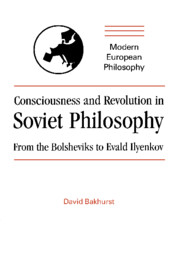Book contents
- Frontmatter
- Contents
- Acknowledgments
- A note on translation, transliteration, and references
- 1 Introduction
- 2 Deborinites, Mechanists, and Bolshevizers
- 3 Vygotsky
- 4 Lenin and the Leninist stage in Soviet philosophy
- 5 Ilyenkov and dialectical method
- 6 The problem of the ideal
- 7 The socially constituted individual: Rethinking thought
- 8 In conclusion
- References
- Index
5 - Ilyenkov and dialectical method
Published online by Cambridge University Press: 10 December 2009
- Frontmatter
- Contents
- Acknowledgments
- A note on translation, transliteration, and references
- 1 Introduction
- 2 Deborinites, Mechanists, and Bolshevizers
- 3 Vygotsky
- 4 Lenin and the Leninist stage in Soviet philosophy
- 5 Ilyenkov and dialectical method
- 6 The problem of the ideal
- 7 The socially constituted individual: Rethinking thought
- 8 In conclusion
- References
- Index
Summary
Our analysis of Ilyenkov's work begins with his treatment of Marx's dialectical method, the topic of his highly regarded first book, The Dialectics of the Abstract and the Concrete in Marx's “Capital,” and of many other of his early writings. In Marx's “method of ascent from the abstract to the concrete,” Ilyenkov chose a subject as controversial as it is obscure. Why did this aspect of Marx's legacy so capture his imagination?
First, Ilyenkov held that Marx's command of dialectical method had made possible the creation of Capital, the culmination of Marx's research and the highest expression of his thought. Thus, part of Ilyenkov's aim was to cast light on the composition of that work and the evaluation of its arguments. Ilyenkov would have thought that this in itself was an essential project, agreeing with Lucio Colletti that the class consciousness of the proletariat “cannot be derived from anywhere but Capital” (Colletti 1969: 236).
Second, Ilyenkov was convinced that the potential applications of Marx's method were not confined to the theory and practice of political economy. On the contrary, he held that Marx had developed a method of universal significance, a necessary condition of successful inquiry in any domain (Ilyenkov 1967a: 186). What Lenin called the “logic of Capital” contained “the only possible and correct procedure for the solution of the specific task of the theoretical cognition of the world” (Ilyenkov 1960a: 135; cf. Lenin 1895–1916: 319). Hence, not only was the method itself of enormous scientific significance, but the question of how a method of such explanatory power could be possible was of great philosophical concern.
- Type
- Chapter
- Information
- Consciousness and Revolution in Soviet PhilosophyFrom the Bolsheviks to Evald Ilyenkov, pp. 135 - 174Publisher: Cambridge University PressPrint publication year: 1991

